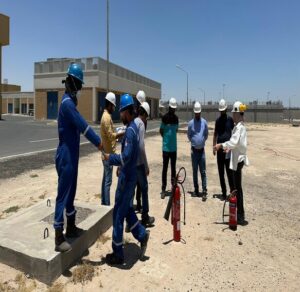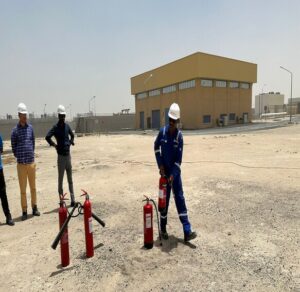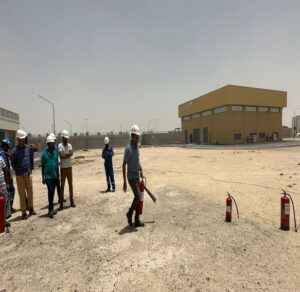
UAE +971 56 1 55 44 66 – Kuwait +965 51 38 38 68 – Oman +968 92827852
UAE +971 56 1 55 44 66
Kuwait +965 51 38 38 68
Menu

UAE +971 56 1 55 44 66 – Kuwait +965 51 38 38 68 – Oman +968 92827852
UAE +971 56 1 55 44 66
Kuwait +965 51 38 38 68
We provide comprehensive fire safety training for corporates. For support with more advanced training requirements or to inquire about on-site training, please contact us.
Upon completion of the fire safety training, you will:
Fires are the second leading cause of death worldwide, underscoring the critical importance of fire safety training. The National Fire Protection Association (NFPA) reports that in the United States alone, over 3,000 people lose their lives and an additional 16,000 sustain injuries annually due to fires. Given that a fire can occur anywhere, anytime, it is vital to equip employees with basic fire emergency response skills. Fire safety training is an essential component of workplace safety and a fundamental part of any company’s health and safety plan. The primary objective of this training is to educate employees on how to effectively respond to a fire emergency.
All employees must understand fire response protocols to act quickly and potentially save lives. As the world becomes more interconnected, the likelihood of fire incidents increases. Fires can ignite and spread swiftly in any setting, underscoring the need for serious fire safety measures. It is vital that every staff member has a basic understanding of fire behavior and emergency procedures. Fire safety training should be mandatory for all employees, regardless of their position within the organization, as it could determine life or death. The importance of fire safety training is immense.
It is a crucial component of any organization’s safety plan in Sharjah, Abu Dhabi, and Dubai. Offering employees the chance to take part in fire safety courses is the most effective way to ensure they are well-versed in this essential topic. Therefore we offer the best comprehensive training program in Sharjah, together with the knowledge and skills needed by employees to successfully prevent fire related accidents in their workplace.
All employees, from junior staff to upper management, should engage in fire safety training. It is vital for everyone in the workplace to comprehend fire hazards and emergency protocols.
Individuals tasked with workplace safety must possess a thorough knowledge of fire safety protocols and procedures to effectively lead and handle emergency situations.
Staff responsible for overseeing and maintaining the building's infrastructure should receive fire safety training to help them recognize potential hazards and respond appropriately in the event of a fire.
Human resources and training managers need to possess fire safety knowledge to incorporate safety protocols into company policies and training initiatives.
Assigned emergency responders are required to complete comprehensive fire safety training to effectively coordinate evacuation plans and provide assistance during emergencies.
Appointed emergency responders must participate in thorough fire safety training to manage evacuation plans and offer help during emergencies.
The fire safety training we offer in Sharjah, Dubai, and Abu Dhabi is an essential element of every organization’s health and safety strategy. This training equips all employees to respond quickly and efficiently during a fire, improving overall safety and potentially saving lives.
Fire safety training equips employees with the knowledge and skills necessary to effectively manage a fire emergency.
Comprehensive training enables employees to identify potential fire hazards and learn how to avert them.
When staff are trained in fire safety protocols, they become more assured in their capacity to manage emergency situations.
Fire safety training helps minimize or prevent property damage and the loss of assets.
Preventing or minimizing fire incidents through training results in savings on property damage, insurance premiums, legal liabilities, and interruptions to business operations.
Employees trained in fire safety are proficient in the correct use of fire extinguishers and other firefighting equipment. This knowledge can help control small fires before they escalate.
Significance of fire safety awareness, Data on fire-related incidents and their consequences.
Recognizing typical fire hazards in various environments (such as homes, workplaces, and public areas), Effective strategies for fire prevention, including the correct storage and management of flammable substances.
Categories of fire extinguishers and their correct applications (such as water, foam, CO2, and dry chemical), Practical training on how to use fire extinguishers, featuring the PASS technique, Summary of additional firefighting equipment (fire blankets, hose reels, and fire hoses).
Creating and rehearsing evacuation plans, Recognizing the significance of unobstructed escape routes and assembly areas, Defining roles and responsibilities during evacuation procedures.
Comprehending various fire alarm systems and their signals, Reacting correctly to fire alarm notifications.
Fire safety protocols and procedures tailored to the workplace, Roles and responsibilities related to fire safety within an organization.
Grasping suitable firefighting techniques for various types of fires, Hands-on demonstrations of fire suppression methods.
Summary of essential concepts and techniques discussed, A written or practical evaluation to assess comprehension.
Identifying whom to reach out to in the event of a fire emergency, Alerting authorities about fire hazards and incidents.






